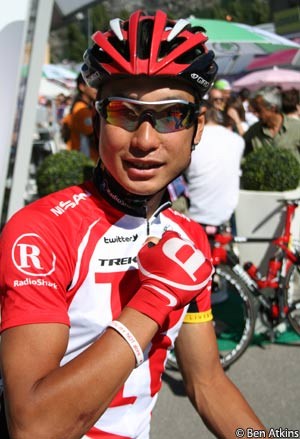Japanese rider wears wristband in support of his country after earthquake and tsunami
 Fumiyuki Beppu (RadioShack) is yet another rider who just completed his very first Giro d’Italia. The race is not the Japanese rider’s first ever Grand Tour as he completed the 2009 Tour de France, where he became, along with Yukiya Arashiro, the first rider from is country to finish the race. Despite that Tour finish though, which was also behind a victory for Alberto Contador, Beppu says that this edition of the Giro d’Italia has been the toughest race of his career.
Fumiyuki Beppu (RadioShack) is yet another rider who just completed his very first Giro d’Italia. The race is not the Japanese rider’s first ever Grand Tour as he completed the 2009 Tour de France, where he became, along with Yukiya Arashiro, the first rider from is country to finish the race. Despite that Tour finish though, which was also behind a victory for Alberto Contador, Beppu says that this edition of the Giro d’Italia has been the toughest race of his career.
“Yes, I think so, yes,” he said to VeloNation, asking if his form was good before the penultimate stage to Sestriere. “[Another] mountain stage, but it is okay. Stage fifteen I had a bad day, but other stages: Zoncolan, yesterday [Macugnaga], was pretty good for my condition. I’m happy to come here but, especially I want to say, this race – in my career, eight years in full – was hard, and I mean really hard.”
Although he has, like the majority of the riders in the peloton, found the race so tough; the beauty of the Corsa Rosa this year has not been lost on him. He also feels that surviving such a hard course will help in his continuing development as a rider.
“But it’s amazing,” he said. “Some of the descents were dangerous, with high speed and I feel that it was harder than the Tour de France that I did in 2009. But after that I felt more progression.”
During the race, Beppu has been sporting a white wristband with the words, printed in red, ‘You are not alone’, and the same in Japanese. This, he says, is to show solidarity with the people of his country, who are still dealing with the after effects of the earthquake and tsunami that struck back in March.
“As we say in Japanese [you are not alone],” he said. “It’s for the Japanese people because of the big earthquake and tsunami. Now, many riders are wearing them: Roman Kreuziger, Paolo Tiralongo, many guys…”
Aside as raising awareness, the main aim of the wristband is to show those back in Japan that the wearer is thinking of them; moral, rather than financial support.
“Also cycling; this is a really tough sport,” he explained. “So we know, the Japanese, who are watching TV or online in Japan, then they see this, it makes more power for them.
“The Japanese people are really happy for it.”